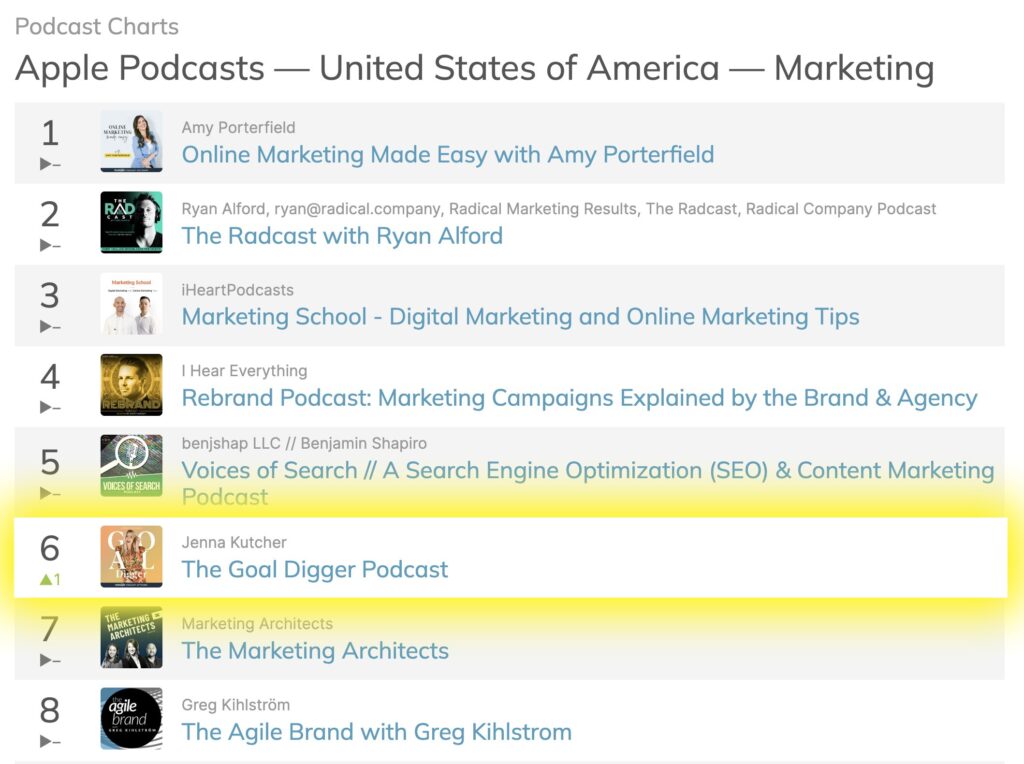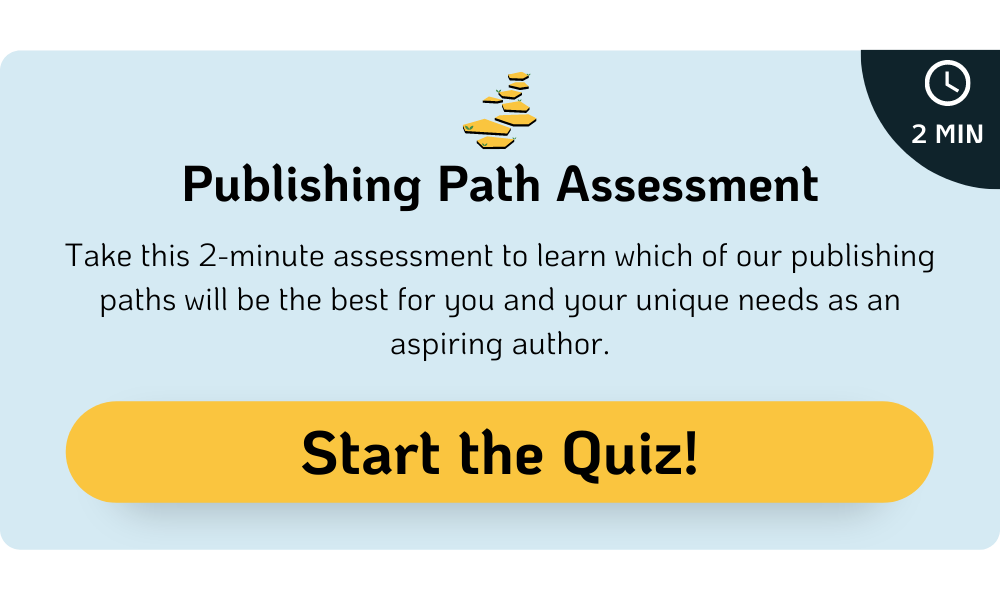Learning how to start an author podcast shouldn’t be complicated. We’ll make it super simple for you, in fact, without a lot of the hassle and jargon you might get elsewhere.
Because the last thing you need is yet another piece of complication in the puzzle of authorhood, right? And after all, you want to start an author podcast, which means at some level, you want to use the podcast to sell books or help others do the same.
Let’s just cut to the chase and start with the equipment you’ll need, along with the steps necessary to get it off the ground and running consistently.
Here’s how to start an author podcast:
Equipment Needed to Start an Author Podcast
Before you get started, it’s helpful to know what you need to start an author podcast. There are two primary approaches to the equipment you’ll need, but it’s important to note that you can really start with minimal equipment that requires nothing more than what you likely already have.
Bloom Where You’re Planted Approach:
This is the method in which you start with where you are. There’s no need to purchase additional equipment.
All you need is:
- A smart phone or other recording device
- A quiet room that doesn’t echo (a car, even)
- A method of uploading the recording (phone or computer)
So really, you have what you need to start. And you might be thinking “but won’t the recordings be low quality?” to which I say, not really. Unless you’re recording on a busy street or with a ton of background noise, the recording is perfectly adequate to get started with. In fact, one of the top 10 marketing podcasts on Apple podcasts started like this.
Jenna Kutcher had the idea to start a podcast, and used her iPhone headphones to record episodes inside her car. That’s all she had to start with and now her podcast is ranked significantly high–which of course helped her sell more books when she launched.

Now she has a microphone and office to record in, but she was well on her way to one of the top podcasts before she ever invested further.
But if you have a smart phone, can connect to the internet, and have a quiet place to record, you have all you need to learn how to start an author podcast.
Advanced Production Approach:
Now, if you have the budget to put into this process, then you can definitely invest in a few things before starting. This would be for those who really want to up the production value and go all-in on their efforts of learning how to start an author podcast.
You want to make this a highly profitable gig and have the funds to start now.
Here’s what you can invest in for starting an author podcast:
- A quality microphone
- Sound-proofing panels
- Sound production software
- Podcast production team
- Intro/Outro video production
As you can see, much of this is extra, and offloads some of the work from you to someone else. The benefits of this are that the sound quality is likely to be better, and it might appear more professionally crafted to new listeners (but you can still have a bad podcast with great equipment because the value of the content itself depends on you and your plan—more on that below).
Plus, if you have all this equipment, you can also record your own audiobook, which is valuable if you plan to record them yourself and have many you want to do.
8 Steps to Start an Author Podcast That’s Unique & Engaging
Now that the equipment is out of the way, the important stuff for learning how to start an author podcast is left. This is where the real value comes from, so take the time to work through each step.
1. Choose Your Type / Niche
“Author podcast” is far too broad a term to choose. There are a lot of different ways one might interpret it. The overall purpose of your podcast will help you discover its niche.
Here are some questions to determine the type and niche:
- Is it about your area of expertise?
- Is it about the author process—writing, publishing?
- Is it guest-heavy where you interview other authors?
- Is it about your personal process of becoming an author?
- Is it about the craft of writing quality books (fiction or non)?
- Is it about selling copies as an author (more marketing than authoring)?
All of this depends on the type of podcast you want to have.
For example, we have two podcasts under our umbrella:
- Self-Publishing School Podcast: Hosted by Chandler Bolt, it’s a guest-centered interview-style podcast in which experts of various fields are interviewed about their process of writing and publishing a book, along with selling copies, and more.
- Authority Figures: Hosted by Matthew Emmorey, this is also a guest-centered podcast around newly published authors and what it has meant to become an author, along with a focus on their areas of expertise.
Both of these types are guest and interview-driven, with the host leading the discussion.
Here are more examples of author podcasts with different angles:
- Writing Excuses: in which many traditionally published authors discuss the writing process, their takes, and give you exercises to improve your craft.
- Helping Writers Become Authors: a craft-driven podcast in which the host discusses many topics of the fiction writing process.
It’s really up to you and what you enjoy talking about. And remember, this can change over time. Give something a shot and see how it progresses. You can also merge versions of this, including guests sometimes but not always.
2. Brand Your Podcast
Learning how to start an author podcast has a lot to do with positioning in the marketplace, which has to do with branding. It’s about more than the logo, colors, and even the name. Most people think that’s all that goes into branding, but there’s something you have to determine first before any of all that:
What do you want your podcast to feel like?
That’s branding, at the end of the day. The colors and other visual details have to go along with what it feels like, but you first have to decide the effect your podcast will have on people.
Here are some questions to decide on this:
- Will it be inspirational?
- Educational?
- Humorous?
- Will you focus on guest experts or analytical industry data?
- Will you focus on a single topic (the niche) or cover a wider range of topics related to being an author?
Another great way to determine this is to ask your friends: “How would you describe my energy when I talk about author stuff?”
The branding will ultimately help the right audience find you, and that’s one of the harder parts of discovering how to start an author podcast, so don’t be afraid to truly model this after yourself and tone you tend to take when talking about these elements.
3. Planning Episodes
You can’t learn how to start an author podcast without a content lineup. These are all the topics you’ll cover and in which order. Usually, you already have a list of these, especially if you’re searching this topic already.
What you should do is find a way to organize this and structure it by release date.
There are a few ways you can plan episodes for an author podcast:
- Randomly with no link between episodes
- Subject-driven months or quarters
- Guest-driven topics followed by a deep-dive episode
- Current-event focused topics (like love-based topics near Valentine’s Day, etc.)
You’ll have to decide what works best for you and what you find success with. Either way, organize these somewhere like in a spreadsheet so you know what to publish and when.
4. Getting Guests
This is a harder part of learning how to start an author podcast. If you don’t have a podcast with many downloads (this is what each “listen” is called), then it’ll be hard to get prolific guests who can actually drive more downloads.
Here are some tips to get guests on your new podcast:
- Lead with the purpose behind the podcast
- Reach out to a large list of potential guests
- Allow them to promote to your audience on the episode
- Utilize an email system with automatic follow-ups to streamline the process
- Provide value to them to promote by offering marketing images/materials for when the episode goes live
- Start small and lower your expectations
The last tip is an important one. When you’re learning how to start an author podcast, you don’t have experience. Expecting a big-name guest to appear isn’t realistic.
Focus on utilizing your network, reach out on Facebook groups of authors to see who might be interested. More than anything, keep trying and keep building your podcast because more downloads you get for each episode, the better guests you’ll be able to feature.
5. Recording
This is the easier part. Record the podcast based on your schedule.
Now, if you’re not great at talking off the cuff, you may need to script or outline each episode, and this is a big part of learning how to start an author podcast. Discover what works for you. If you have guests, make sure you have a set of questions ready to ask them, but be open to steering the conversation where it may lead.
And of course, make sure the episode is actually being recorded when you sit down to do it 🙂
6. Producing
The “production” process of learning how to start an author podcast will involve taking the raw recording and turning it into something that sounds like a podcast episode.
You can do this all at once by recording the introduction and outro at the beginning and end of your recording. But you can also have the intro and outro pre-recorded and use an audio software to put it together.
Podcast production might also include adding sound effects or music to the episode when needed, but this is also optional.
Optional: having a “proper” introduction created for the podcast. It’s in quotations because this isn’t fully necessary. You can easily produce the podcast in such a way that it has some nice introduction music while you just say “I’m [your name] and welcome to another podcast of [the topic].” Many larger podcasts do have an introduction, and you can learn from what those sound like.
7. Publishing Your Podcast
Once you have the final recording, it’s time to upload and publish it across various podcast-hosting platforms. There is no need to be “exclusive” to a specific podcast platform at this point. You want to get your new author podcast to as many people as possible.
The process of learning how to start an author podcast involves figuring out these technical pieces.
Here’s a great article that goes through the steps of actually uploading and publishing your podcast.
Learning how to start an author podcast can seem overwhelming, but it doesn’t have to be. Take your time with each step, and focus on the task at hand. You’ll have an author podcast in no time!
